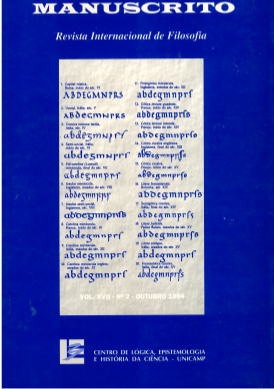Resumen
O objetivo deste artigo é contribuir para a reabilitação do psicologismo como doutrina sobre os fundamentos da lógica. O psicologismo define-se por dois princípios: 1) os fatos sobre o raciocínio humano são relevantes para a seleção de princípios que são prescritos pela lógica normativa e 2) as entidades lógicas (conceitos, proposições, argumentos, etc.) são entidades mentais. Só o segundo princípio é analisado aqui. Em primeiro lugar, damos um argumento que busca provar que o platonismo de Frege é incompatível com sua visão da lógica como disciplina normativa. Em seguida, apresentam-se refutações dos argumentos antimentalistas de Frege.
Citas
Aitchison, J. (1978). Linguistics. (London, Hodder and Stoughton).
Cheng, P.W. and Holyoak, K.J. (1985). Pragmatic re-soning schemas. Cognitive Psychology, 17, 391-416.
Churchland, P.M. (1984). Matter and consciousness: a contemporary introduction to the philosophy of mind. (Cambridge MA, The MIT Press).
Churchland, P.M. (1986). Some reductive strategies in neurobiology. Mind, 95, 279-309.
Cohen, L.J. (1981). Can human irrationality be experimentally demonstrated? The Behavioral and Brain Sciences, 4, 317- 370.
Currie, G. (1982). Frege: an introduction to his philosophy. (Brighton, Harvester Press).
Evans, J. St B.T. (1982). The psychology of deductive reasoning. (London, Routledge and Kegan Paul).
Frege, G. (1960). P. Geach and M. Black Translations from the philosophical writings of Gottlob Frege. 2nd edition. (Oxford, Blackwell).
Frege, G. (1962). The Basic Laws of Arithmetic. Translated by M. Furth. (Berkeley and Los Angeles, University of California Press).
Frege, G. (1967). The Thought: a logical inquiry. In Strawson, P.F. (ed) Philosophical logic. (Oxford, Oxford University Press), 17-38.
Frege, G. (1974). The Foundations of Arithmetic. German text with English translation by J.L. Austin (Oxford, Blackwell).
Frege, G. (1979). Posthumous Writings. Translated by P. Long and R. White. (Oxford, Blackwell).
Gardner, H. (1985). The Mind's New Science: a History of the Cognitive Revolution. (New York, Basic Books).
Gillies, D.A. (1982). Frege, Dedekind, and Peano on the foundations of arithmetic. (Assen, Van Gorcum).
Goldman, A.I. (1978). Epistemics: the regulative theory of cognition. Journal of Philosophy, 75, 509-523.
Johnson-Laird, P.N. (1983). Mental Models. (Cambridge, Cambridge University Press).
Lyons, J. (1969). Introduction to theoretical lingusitics. (Cambridge, Cambridge University Press).
Macnamara, J. (1986). A border dispute: the place of logic in psychology. (Cambridge MA, The MIT Press).
Musgrave, A. (1972). George Boole and psychologism. Scientia, 107, 593-608.
Mynatt, C.R., Doherty, M.E. and Tweney, R.D. (1977). Confirmation bias in a simulated research environment: an experimental study of scientific inference. Quarterly Journal of Experimental Psychology, 29, 85-95.
Resnik, M.D. (1980). Frege and the Philosophy of Mathematics. (Ithaca NY, Cornell University Press).
Resnik, M.D. (1985). Logic: normative or descriptive? The ethics of belief or a branch of psychology? Philosophy of science, 52, 221-238.
Smolensky, P. (1988). On the proper treatment of connectionism. Behavioral and Brain Sciences, 11, 1-23.
Sober, J. (1978). Psychologism. J. Theory Soc. Behavior, 8, 165-191.
Stich, S.P. and Nisbett, R.E. (1980). Justification and the psychology of human reasoning. Philosophy of Science, 47, 188-202.
Thagard, P. (1982). From the descriptive to the normative in psychology and logic. Philosophy of Science, 49, 24-42.
Wason, P.C. (1966). Reasoning. In B. Foss (ed.), New Horizons in psychology, vol. 1. (Harmondsworth, Middlesex, Penguin).

Esta obra está bajo una licencia internacional Creative Commons Atribución 4.0.
Derechos de autor 1994 Manuscrito: Revista Internacional de Filosofia


